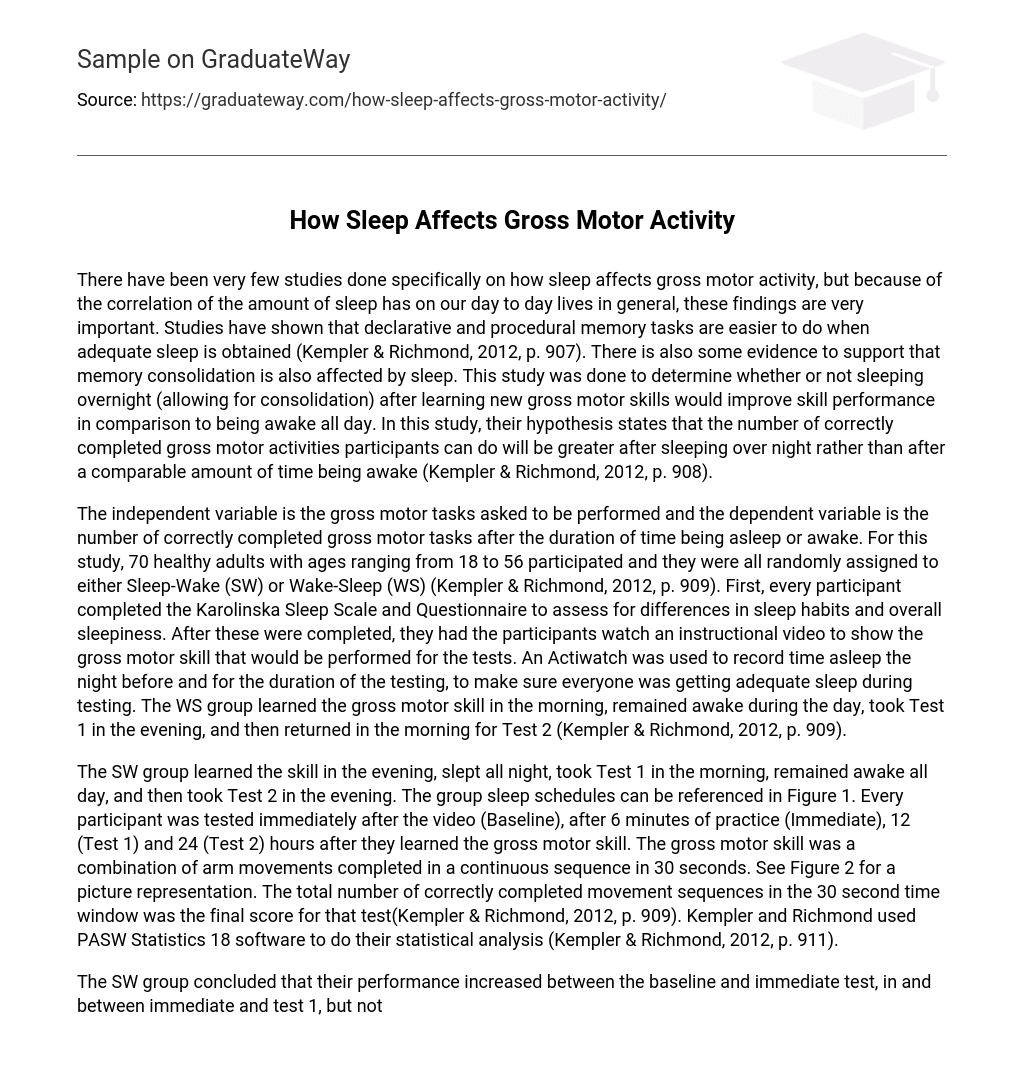There have been very few studies done specifically on how sleep affects gross motor activity, but because of the correlation of the amount of sleep has on our day to day lives in general, these findings are very important. Studies have shown that declarative and procedural memory tasks are easier to do when adequate sleep is obtained (Kempler & Richmond, 2012, p. 907). There is also some evidence to support that memory consolidation is also affected by sleep. This study was done to determine whether or not sleeping overnight (allowing for consolidation) after learning new gross motor skills would improve skill performance in comparison to being awake all day. In this study, their hypothesis states that the number of correctly completed gross motor activities participants can do will be greater after sleeping over night rather than after a comparable amount of time being awake (Kempler & Richmond, 2012, p. 908).
The independent variable is the gross motor tasks asked to be performed and the dependent variable is the number of correctly completed gross motor tasks after the duration of time being asleep or awake. For this study, 70 healthy adults with ages ranging from 18 to 56 participated and they were all randomly assigned to either Sleep-Wake (SW) or Wake-Sleep (WS) (Kempler & Richmond, 2012, p. 909). First, every participant completed the Karolinska Sleep Scale and Questionnaire to assess for differences in sleep habits and overall sleepiness. After these were completed, they had the participants watch an instructional video to show the gross motor skill that would be performed for the tests. An Actiwatch was used to record time asleep the night before and for the duration of the testing, to make sure everyone was getting adequate sleep during testing. The WS group learned the gross motor skill in the morning, remained awake during the day, took Test 1 in the evening, and then returned in the morning for Test 2 (Kempler & Richmond, 2012, p. 909).
The SW group learned the skill in the evening, slept all night, took Test 1 in the morning, remained awake all day, and then took Test 2 in the evening. The group sleep schedules can be referenced in Figure 1. Every participant was tested immediately after the video (Baseline), after 6 minutes of practice (Immediate), 12 (Test 1) and 24 (Test 2) hours after they learned the gross motor skill. The gross motor skill was a combination of arm movements completed in a continuous sequence in 30 seconds. See Figure 2 for a picture representation. The total number of correctly completed movement sequences in the 30 second time window was the final score for that test(Kempler & Richmond, 2012, p. 909). Kempler and Richmond used PASW Statistics 18 software to do their statistical analysis (Kempler & Richmond, 2012, p. 911).
The SW group concluded that their performance increased between the baseline and immediate test, in and between immediate and test 1, but not between or in test 2. The WS group concluded that their performance increase between the baseline and immediate test, in and between test 1 and test 2, but not in between immediate and test 1. These results support the idea that performance improvements for gross motor skills improve after sleeping so that consolidation can occur (Kempler & Richmond, 2012, p. 913). In a previously conducted study, the results of the similar experiment were not compatible with the results obtained from this study. It tested participants ability to jump to their maximum vertical height, but the test was performed in the same manner. The results found that there was not correlation between sleep or being awake on their performance of gross motor tasks (Kempler & Richmond, 2012, p. 913). This study concluded that after a night’s sleep, performing a newly learned gross motor skill improves but not after a day of being awake. This was show when the participants that completed more correct sequences of the gross motor task were the ones who had had a nights sleep while those who had not slept had no difference in performance. This supports their hypothesis that performance of gross motor tasks will improve after a night’s rest to allow consolidation to occur. In future studies the experiment could be improved by measuring the sleep more directly and efficiently, the Actiwatch malfunctioned with a few of the participants causing them to have to be removed from the study.
You could also find a way to ensure no one practices the motions in between the tests. Although there was no indication of gender having an effect on performance in this study, there was also a possibility of having unequal gender representation in the groups. In a future study, one could set up a more complex experimental design where the participants are first grouped by gender, and then from those groups they are randomly and equally assigned to the different test groups. This study is important in the field because it is a research on a newer topic of interest and it sets groundwork for further investigation and experiments.





